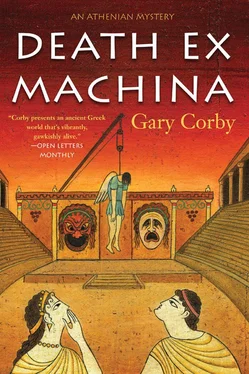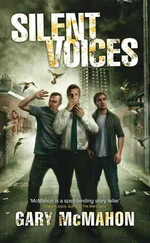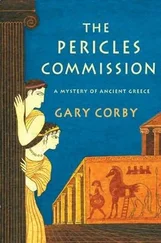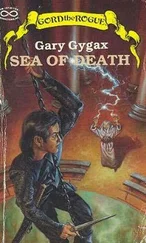Gary Corby - Death Ex Machina
Здесь есть возможность читать онлайн «Gary Corby - Death Ex Machina» весь текст электронной книги совершенно бесплатно (целиком полную версию без сокращений). В некоторых случаях можно слушать аудио, скачать через торрент в формате fb2 и присутствует краткое содержание. Год выпуска: 2015, ISBN: 2015, Издательство: Soho Press, Жанр: Исторический детектив, на английском языке. Описание произведения, (предисловие) а так же отзывы посетителей доступны на портале библиотеки ЛибКат.
- Название:Death Ex Machina
- Автор:
- Издательство:Soho Press
- Жанр:
- Год:2015
- ISBN:978-1-61695-520-5
- Рейтинг книги:3 / 5. Голосов: 1
-
Избранное:Добавить в избранное
- Отзывы:
-
Ваша оценка:
- 60
- 1
- 2
- 3
- 4
- 5
Death Ex Machina: краткое содержание, описание и аннотация
Предлагаем к чтению аннотацию, описание, краткое содержание или предисловие (зависит от того, что написал сам автор книги «Death Ex Machina»). Если вы не нашли необходимую информацию о книге — напишите в комментариях, мы постараемся отыскать её.
Death Ex Machina — читать онлайн бесплатно полную книгу (весь текст) целиком
Ниже представлен текст книги, разбитый по страницам. Система сохранения места последней прочитанной страницы, позволяет с удобством читать онлайн бесплатно книгу «Death Ex Machina», без необходимости каждый раз заново искать на чём Вы остановились. Поставьте закладку, и сможете в любой момент перейти на страницу, на которой закончили чтение.
Интервал:
Закладка:
Gary Corby
Death Ex Machina
SCENE 1
In my time as an investigator I had received many difficult assignments, problems that were usually dangerous, often deadly, and sometimes downright impossible.
But no one before had ever asked me to arrest a ghost.
“You can’t be serious, Pericles,” I said.
“Of course I’m not,” he replied. He sounded exasperated. “But unfortunately for both of us, the actors are completely serious.”
“What actors?” I asked.
“The ghost is in the Theater of Dionysos,” Pericles said. “The actors refuse to enter the theater until the ghost is gone.”
“Oh,” I said, and then, after I’d thought about it, “Oh dear.”
The timing couldn’t be worse, because the Great Dionysia was about to begin. The Dionysia was the largest and most important arts festival in the world. Thousands of people were flocking into Athens. They came from every corner of civilization: from the city states of Greece, from Egypt and Crete and Phoenicea and Sicily, from Ionia and Phrygia. All these people came to hear the choral performances and to see the plays: the comedies and the tragedies.
Most of all they came for the tragedies. Every city has fine singers. Every city has comics who can make you laugh. But only Athens, the greatest city in all the world, has tragedy.
“The producers have ordered the actors back to work,” Pericles said. “The playwrights have begged them, even I have spoken to them, but the actors say they fear for their lives.”
He wiped the sweat from his brow as he spoke. Pericles had hailed me in the middle of the agora, which at this time of the morning was always crowded. He had called me by my name, so loudly that every man, woman, and child in the marketplace had turned to look. Then Pericles had lifted the skirt of his ankle-length chiton and in full view of the people had run like a woman, leaping over jars of oil for sale and dodging around laden shoppers, all to speak with me. That alone told me how serious the situation was. Pericles prided himself on his statesman-like demeanor. It was part of the public image he courted as the most powerful man in Athens.
It was easy to see why Pericles was worried. If the actors refused to rehearse, they would put on poor performances. We would look like idiots before the rest of the civilized world. Or worse, the actors wouldn’t be able to perform at all. The festival was in honor of the god Dionysos, who in addition to wine and parties was also the god of the harvest. If we failed to honor the God as was his due, then there was no telling what might happen to the crops. The people might starve if Dionysos sent us a poor year.
There was no doubt about it. The actors had to be induced to return to work.
Pericles said, “What I want you to do, Nicolaos, is make a show of investigating this ghost. Do whatever it is you do when you investigate a crime. Then do something-anything-to make the actors think you’ve captured the ghost.”
“How do you get a ghost out of a theater?” I asked.
“How in Hades should I know?” Pericles said. “That’s your job.”
I couldn’t recall placing a “Ghosts Expelled” sign outside my door.
“Surely there must be someone who can do this better than me,” I said.
“You’re the only agent in Athens, Nicolaos,” Pericles said in persuasive tones. “The only one who’ll investigate and then tell the people that the ghost is gone.”
Which was true. Though there were plenty of thugs for hire, and mercenaries looking for work, I was the only man in Athens who took commissions to solve serious problems. I pointed out this commission aspect to Pericles.
“You may consider this a commission,” Pericles said, through gritted teeth. He hated spending money.
The promise of pay put another complexion on it. When Pericles had waylaid me I had been on my way to see to my wife’s property. My wife, Diotima, owned a house on the other side of the city, one in a sad state of disrepair. Repairs cost money. Money I didn’t have.
I still didn’t think I was the man for the job. Yet I reasoned it must be possible to remove a ghost, assuming such things even existed. Otherwise our public buildings would be full of them, considering how many centuries the city had stood.
Expelling a ghost might prove difficult, but it certainly wasn’t dangerous, deadly, or downright impossible. I made an easy decision.
“Then I shall rid the theater of this ghost,” I promised Pericles.
SCENE 2
The case was urgent. I abandoned my plan to see to repairs and turned around. I had no idea about ghosts, but I knew someone who would. I went home to ask my wife.
I found Diotima in our courtyard. She reclined on a couch, with a bowl of olives and a glass of watered wine by her side. My little brother, Socrates, stood before her, reciting his lessons. Socrates had been expelled from school the year before, for the crime of asking too many questions. Ever since then, Diotima had been his teacher. The arrangement had worked surprisingly well.
I interrupted the lesson to deliver my news.
“There’s no such thing as ghosts,” Diotima said the moment I finished speaking. She paused, before she added thoughtfully, “Of course, there might be a psyche haunting the theater.”
“Is there a difference, Diotima, between psyches and ghosts?” Socrates asked. He’d listened in, of course. I’d long ago given up any hope of keeping my fifteen-year-old brother out of my affairs.
“There’s a big difference, Socrates,” Diotima said. “Everybody has a psyche. It’s your spirit, the part of you that descends to Hades when you die. Ghosts, on the other hand, are evil spirits that have never been people. The religion of the Persians has evil spirits that they call daevas. I think the Egyptians have evil spirits too. But we Hellenes don’t credit such things.”
“Then the actors might have seen a psyche?” Socrates said.
Diotima frowned. “I hope not. If a body hasn’t been given a proper burial then its psyche will linger on earth. It should never happen, but sometimes it does.” She turned to me. “Nico, are there any dead bodies lying about the theater?”
“I like to think someone would have mentioned it if there were,” I said. “If there’s a body, we’ll have to deal with it, but there’s another possibility.”
“What’s that?” Diotima asked.
“That the actors are imagining things.” I helped Diotima off the couch. “We’ll have to go see for ourselves.”
SCENE 3
Socrates tagged along. There are few things harder to shake than a little brother.
Our house lies outside the city walls, to the southeast. The three of us entered the inner city through the Itonian Gate.
Two guards stood on duty, both of them bored, but too scared to slack off for fear their officer would check on them. They were ephebes , trainee recruits who were serving out their mandatory two years in the army, as must every young man from the moment he turns eighteen until he’s twenty. I knew how bored they were because three years ago, I’d been one of them.
These two were local lads from our own deme. Their families lived only a few streets from our own. They knew us and waved us through with a pleasant word and an appreciative glance at Diotima.
Diotima wore a new chiton of linen that she’d dyed in bright party colors. When she’d appeared in it that morning, I’d pointed out that the Great Dionysia hadn’t begun yet. Diotima had replied that it was close enough.
Читать дальшеИнтервал:
Закладка:
Похожие книги на «Death Ex Machina»
Представляем Вашему вниманию похожие книги на «Death Ex Machina» списком для выбора. Мы отобрали схожую по названию и смыслу литературу в надежде предоставить читателям больше вариантов отыскать новые, интересные, ещё непрочитанные произведения.
Обсуждение, отзывы о книге «Death Ex Machina» и просто собственные мнения читателей. Оставьте ваши комментарии, напишите, что Вы думаете о произведении, его смысле или главных героях. Укажите что конкретно понравилось, а что нет, и почему Вы так считаете.












